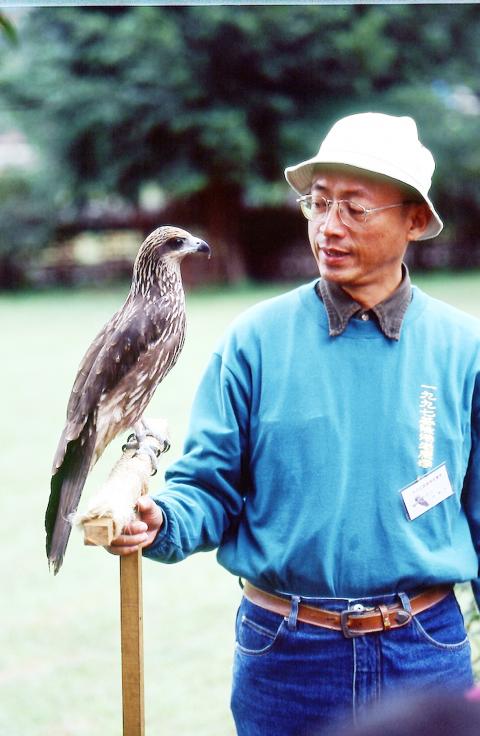A new documentary Fly, Kite, Fly (老鷹想飛) made by Taiwanese nature photographer Liang Chieh-te (梁皆得) depicts a bird-watcher who spent 20 years recording the behavior of black kites in Taiwan.
In 1991, Liang began accompanying Shen Chen-chung (沈振中) on his trips to observe the medium-sized raptor, and documented his activities for more than two decades, resulting in the 76-minute movie, that is to be released nationwide on Nov. 20.
In 1992, Shen, then 38, pledged to make a detailed account of the birds over the following 20 years, after he witnessed the 1991 disappearance of a group of black kites from Waimushan (外木山) in Keelung, according to the the producer of the documentary, the Taipei-based Raptor Research Group of Taiwan (RRGT).

Photo courtesy of Activator Marketing
Since then, Shen has traveled anywhere in Taiwan there were signs of black kites, from Keelung to Pingtung County. Choosing to keep his distance from the birds to avoid disturbing them, he carefully and quietly and faithfully wrote down his observations.
“Instead of saying I discovered them, it would be more appropriate to say they captured me and wanted me to record everything that happened to them,” Shen wrote in one of three of his books on black kites.
To further devote himself to his passion, Shen quit his job as a high-school teacher several years after he starting observing black kites.

Photo courtesy of Activator Marketing
Shen “would watch the sky through binoculars as the sun began to sink, counting each black kite one by one. He seemed to be taking an evening roll call of the raptor that belongs to the sky,” wrote Chiu Chun (邱惇) in a July 22 article on Shen published on news Web site CrowdWatch.
Chiu participated in fundraising efforts to support the documentary.
Writer, poet and conservationist Liu Ke-hsiang (劉克襄) compared Shen’s dedication and efforts to “conduct deep dialogues with the kites” to Jane Goodall’s long-term observation of chimpanzees in Africa.
Goodall’s “surprising experience of being treated as part of their [the chimps’] community also happened to Shen,” Liu wrote in an article published in August about his encounter with the bird-watcher.
According to the RRGT, black kites have flourished in neighboring countries, but not in Taiwan, where their total numbers have declined to about 300. The raptors were seen nationwide before the 1980s, but now they only inhabit the northern and southern tips of the island in small flocks, the RRGT said.
Shen’s observations inspired the government and the Institute of Wildlife Conservation at the National Pingtung University of Science and Technology to launch a study in 2010 on what had caused the decline of black kites in Taiwan.
During the study, a group of field investigators, students at the institute and RRGT members led by researcher Lin Hui-shan (林惠珊) found that the improper use of pesticides by farmers might have been one of the major culprits, the RRGT said.
Having filmed the documentary over 23 years, Liang aims to allow the audience access to the bird’s primitive mind and encourage awareness of the warning delivered by its dwindling numbers, the group said.
Wu Nien-jen (吳念真), a well-known scriptwriter, director and author, narrated the film, while the score was composed by Lim Giong (林強), a popular songwriter and pop singer.

A strong continental cold air mass is to bring pollutants to Taiwan from tomorrow, the Ministry of Environment said today, as it issued an “orange” air quality alert for most of the country. All of Taiwan except for Hualien and Taitung counties is to be under an “orange” air quality alert tomorrow, indicating air quality that is unhealthy for sensitive groups. In China, areas from Shandong to Shanghai have been enveloped in haze since Saturday, the ministry said in a news release. Yesterday, hourly concentrations of PM2.5 in these areas ranged from 65 to 160 micrograms per cubic meter (mg/m³), and pollutants were

Taiwan’s armed forces have established response protocols for a wide range of sudden contingencies, including the “Wan Chun Plan” to protect the head of state, the Ministry of Defense (MND) said today. After US President Donald Trump on Saturday launched a series of airstrikes in Venezuela and kidnapped Venezuelan President Nicolas Maduro, concerns have been raised as to whether China would launch a similar “decapitation strike” on Taiwan. The armed forces regularly coordinate with relevant agencies and practice drills to ensure preparedness for a wide range of scenarios, Vice Minister of National Defense Hsu Szu-chien (徐斯儉) told reporters before a

EVA Airways on Saturday said that it had suspended a pilot and opened an investigation after he allegedly lost his temper and punched the first officer several times as their plane was taxiing before takeoff at Los Angeles International Airport. According to a report published on Thursday by The Reporter, the incident occurred after the flight’s Malaysian first officer tried to warn the Taiwanese pilot, surnamed Wen (文), that he was taxiing faster than the speed limit of 30 knots (55.6kph). After alerting the pilot several times without response, the first officer manually applied the brakes in accordance with standard operating

NOT AN OPENING: Trump’s violation of international law does not affect China’s consideration in attacking Taiwan; Beijing lacks capability, not precedent, an official said Taiwanese officials see the US’ capture of the president of Venezuela as a powerful deterrent to Beijing’s aggression and a timely reminder of the US’ ability to defeat militaries equipped with Chinese-made weapons. The strikes that toppled Venezuelan President Nicolas Maduro signaled to authoritarian leaders, including Chinese President Xi Jinping (習近平), US President Donald Trump’s willingness to use military might for international affairs core to US interests, one senior official in Taipei’s security circle said. That reassured Taiwan, the person said. Taipei has also dismissed the idea that Trump’s apparent violation of international law could embolden Beijing, said the official, who was not